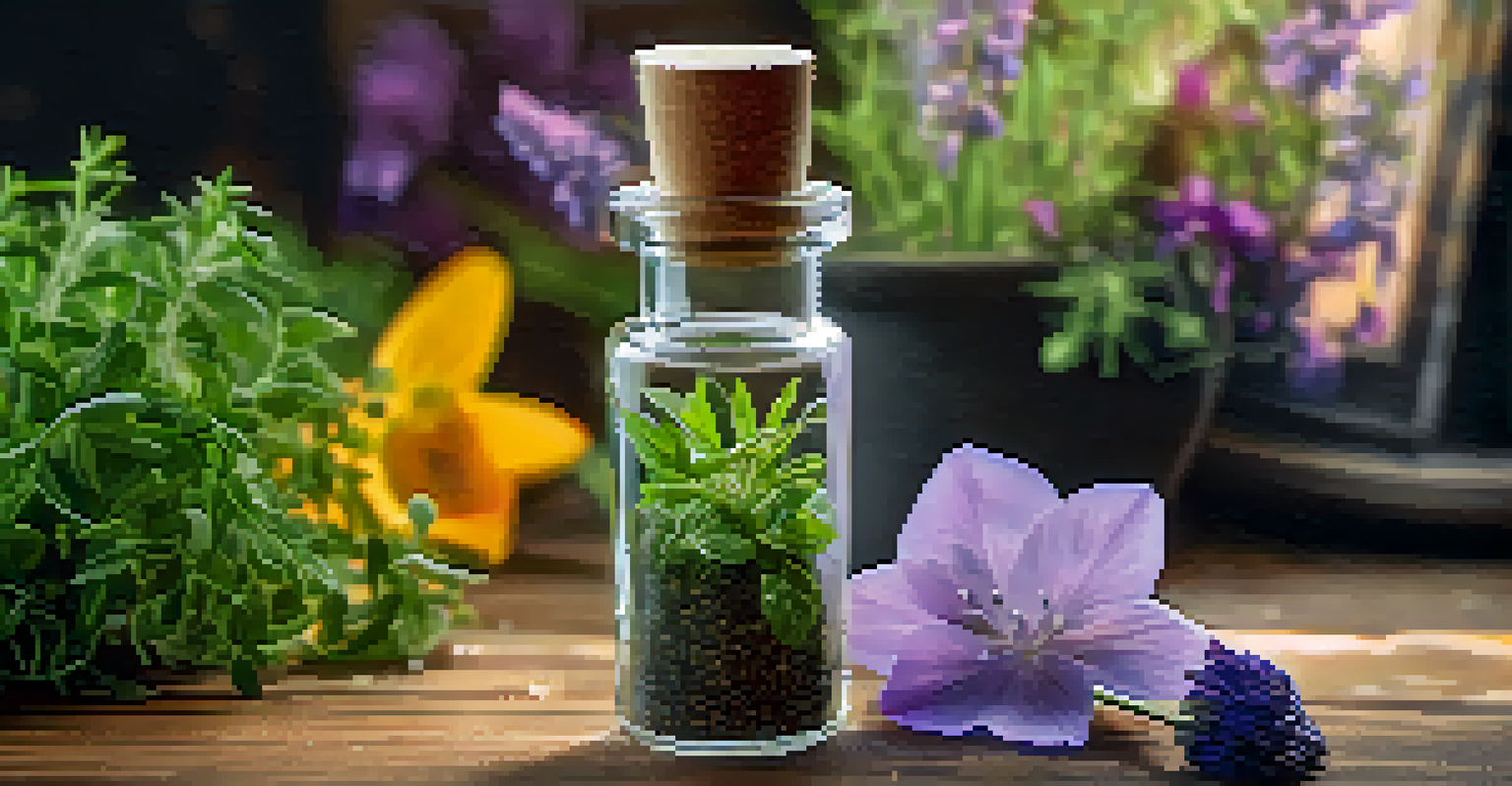Entheogens and Criminal Justice Reform: A Legal Perspective

Understanding Entheogens and Their Historical Context
Entheogens, often used in spiritual or therapeutic contexts, refer to substances that can induce altered states of consciousness. Historically, cultures worldwide have utilized these substances in rituals for healing and spiritual growth. This rich tapestry of use raises questions about their role in modern society, particularly in relation to criminal justice.
Psychedelics can help us understand ourselves and the world around us in ways that traditional medicine cannot.
In many cultures, entheogens have been revered as sacred tools, yet in contemporary times, they are often classified as illegal drugs. This dichotomy highlights a significant gap between societal perceptions and historical applications. Understanding this context is crucial when discussing their potential for reforming legal systems.
As conversations around drug policy evolve, acknowledging the historical significance of entheogens may pave the way for more compassionate legal frameworks. The movement for criminal justice reform increasingly seeks to address these outdated perceptions, advocating for a reevaluation of entheogen laws.
The Current Landscape of Entheogen Legislation
Currently, entheogens are largely categorized under strict drug laws, often leading to harsh penalties for their use and possession. This legal status has created a significant divide between those advocating for their therapeutic potential and lawmakers enforcing prohibition. However, a growing number of jurisdictions are beginning to rethink these regulations, recognizing the need for reform.

For instance, some states have decriminalized or legalized certain entheogens for therapeutic use, reflecting a shift in public opinion and scientific understanding. This trend suggests a potential pathway for broader reforms that could reshape how society interacts with these substances. Advocates argue that such changes could reduce the burden on the criminal justice system.
Entheogens and Historical Significance
Entheogens have a rich history in spiritual practices, contrasting with their current illegal status in many societies.
As more studies emerge highlighting the therapeutic benefits of entheogens—particularly in mental health treatment—the legal landscape may continue to evolve. This evolution could ultimately lead to more informed and humane policies that prioritize health and well-being over criminalization.
The Role of Science in Shaping Legal Perspectives
Scientific research plays a pivotal role in transforming public perception and legal frameworks surrounding entheogens. Studies have shown promising results in using substances like psilocybin and ayahuasca for treating depression, anxiety, and PTSD. This mounting evidence challenges the traditional views of these substances as merely illegal drugs.
The war on drugs has failed. It’s time to rethink our approach to drug policy and consider the potential benefits of entheogens.
As researchers publish their findings, there's a growing call for legal systems to acknowledge the potential benefits of entheogens. This shift towards evidence-based policy could lead to reforms that not only decriminalize but also regulate the use of these substances in therapeutic settings. Such changes would prioritize public health over punitive measures.
Moreover, the integration of scientific data into legal discussions fosters a more nuanced approach to drug policy. This approach encourages lawmakers to consider the complexities of substance use and the potential for rehabilitation rather than punishment, reflecting a significant shift in the criminal justice paradigm.
Healing and Rehabilitation: A New Approach
The current criminal justice system often emphasizes punishment over rehabilitation, particularly concerning drug offenses. However, the therapeutic potential of entheogens suggests a more effective path forward. By integrating these substances into treatment programs, we can foster healing rather than perpetuating cycles of incarceration.
Examples from places where entheogens have been legalized for therapeutic use show promising outcomes. Participants report significant improvements in mental health, contributing to lower recidivism rates. This evidence supports the argument that treating addiction and mental health issues with compassion and understanding can lead to better societal outcomes.
Growing Movement for Legal Reform
There is an increasing push for legislative changes that recognize the therapeutic potential of entheogens and prioritize public health.
Advocates for criminal justice reform are increasingly highlighting these successes, pushing for policies that support healing over punitive measures. By embracing a more holistic approach to substance use, society can reduce stigma and promote recovery, ultimately benefiting individuals and communities alike.
Social Equity and Entheogen Access
As we consider legal reforms around entheogens, it's crucial to address issues of social equity. Historically, marginalized communities have been disproportionately affected by drug laws, facing harsher penalties and systemic discrimination. Legalizing entheogens presents an opportunity to rectify these injustices and ensure equitable access to therapeutic benefits.
Advocacy groups are calling for policies that prioritize access to entheogenic treatments for those who have been most impacted by drug enforcement. This includes ensuring that communities historically targeted by these laws can participate in and benefit from the emerging entheogen market. A focus on social equity is essential for creating a fair and just legal framework.
By integrating social justice principles into the conversation around entheogens, reform efforts can foster inclusivity and healing. This holistic approach not only benefits individuals but also strengthens community ties, promoting a sense of shared responsibility and collective growth.
The Intersection of Spirituality and Legal Reform
For many, entheogens are not just substances but sacred tools used in spiritual practices. This perspective raises important questions about the intersection of spirituality and law. As more people advocate for the legal use of entheogens in spiritual contexts, the need for legal recognition becomes increasingly apparent.
Legalizing entheogens for spiritual use could pave the way for broader acceptance and understanding of their role in healing and personal growth. This recognition acknowledges the diverse cultural and spiritual traditions that have used these substances for centuries. It also challenges the monolithic view of drug use as purely recreational or harmful.
Social Equity in Entheogen Access
Legalizing entheogens offers a chance to address historical injustices faced by marginalized communities in drug enforcement.
By considering the spiritual dimensions of entheogen use, lawmakers can create more inclusive policies that respect individual beliefs and practices. This shift not only enriches the dialogue around drug reform but also empowers individuals to explore their spirituality without fear of legal repercussions.
Looking Ahead: The Future of Entheogens and Justice
As the conversation around entheogens and criminal justice reform continues to evolve, the future looks promising. With increasing public support and scientific validation, there is a growing movement advocating for policy changes that reflect a more compassionate approach to drug use. This shift could ultimately reshape the narrative around entheogens in society.
Future reforms may include comprehensive frameworks that regulate the therapeutic use of entheogens, ensuring safety and access for all. By prioritizing public health and individual rights, these frameworks could serve as models for other areas of drug legislation. The potential for systemic change is on the horizon, driven by advocates and researchers alike.

Ultimately, the journey toward reforming entheogen laws is about more than just legal change; it's about fostering understanding, compassion, and healing. As society embraces this new perspective, we have the opportunity to create a more equitable and just system for all.